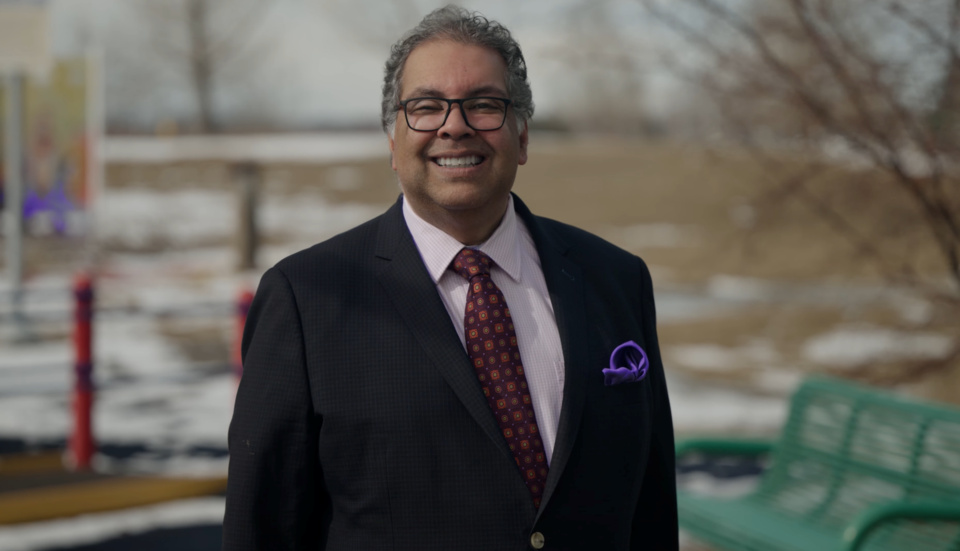Naheed Nenshi has thrown his hat into the ring.
After months of speculation by media and the public, Nenshi announced his candidacy for the Alberta NDP leadership race today at 1 p.m. through social media.
In an interview with the Western Wheel, Nenshi highlighted how he would focus on issues affecting Albertans outside of urban centres.
"We have rural ERs closing all the time, we have places struggling to get family doctors and other physicians in place, we've had promises of universal broadband and rollover at every 20 years that have not yet been fulfilled, the provincial government can't even pave the roads well," said Nenshi. "But I'm not arrogant enough to assume that I know what the most important issues for people living outside of the big cities in Alberta are.
"What I can promise is that I will listen that people will get a fair hearing and that we will have an open and transparent conversation about how we can make life better, whether you're in agriculture or ranching, whether you live in a big city or small town or on the farm. We're all Albertans and we all deserve to do better."
Nenshi served as mayor of Calgary from 2010 to 2021 and considers himself a Calagrian, but he has some rural roots.
"I grew up in northeast Calgary but I also grew up just outside of Red Deer and I went to a County of Red Deer school, River Glen School, which has since closed," said Nenshi.
While Nenshi's work has focused primarily on urban environments like Calgary, he emphasized his stance on energy and the work he had previously done outside of Calgary.
"As the government, we have to be able to build a strong and prosperous economy for the future, and that must include a powerful oil and gas sector and energy while being environmentally sustainable," he said.
"The provincial government claims to be a champion of the energy sector, but the UCP has gotten precisely zero miles of pipeline to tidewater. Now, Rachel Notley and I convinced the federal government to build the Trans Mountain expansion, for example."
Nenshi acknowledged that while rural ridings tend to lean more conservative, he plans to commit much of his time and resources to engaging with rural communities both as a candidate in the leadership race and as leader during the 2027 provincial election.
"Highwood, just southwest of Calgary, the NDP received 30 per cent in that riding, which is way more than they've ever received before," said Nenshi. "It also means that one-third of people in a very stereotypical conservative riding in southern Alberta are actually interested in the New Democrat message.
"President Obama, when he ran, ran famously on a 50-state strategy, where he was visible in every one of those states, even if people were telling him there was no way he could win there. For me, if I were to win the leadership, then I've got three years before the next election, and in those three years, I intend to be visible in every corner to really talk to Albertans about what they value, what their hopes and dreams are for Alberta, and how I might be able to help."
Many Albertans, both within and outside of the Alberta NDP, have mixed opinions on Nenshi's previous status as an outsider of the party.
"I think the benefit to rural voters is that he is an outsider," said Sheila Stacey, president of the Highwood NDP constituency association. "On one side that can be a positive thing. He can shake it up a bit, bring a new perspective, because let's be honest, the party struggled with rural communities.
"That said, he is quite known and he is associated with an urban vibe. An academic, urban mayor, how does he plan to connect with rural voters, who have traditionally not always connected with urban perspectives and urban issues? That brings some preconceived notions."
Nenshi hopes that rural voters will take the time to meet with him.
"Like Popeye, I am what I am," he said. "I sure hope that people see me as someone who is of Alberta. I hope that people will see me as someone who comes in and speaks to their values and has an opportunity to talk about how we can create that better future.
"You know, I grew up here, both as I said in Calgary and in Red Deer County, but more important than that, I'm someone who is inspired, by the big sky and by the mountains and by the Prairie, to think big. I know that Albertans in every corner of the province think big and that we have so much more that unites us than that divides us, from our love for the land to our desire for a better future for our kids and grandkids."
Nenshi joins Gil McGowan, who announced his candidacy on March 7, as the two non-MLA candidates up against four current MLAs: Jodi Calahoo Stonehouse, Kathleen Ganley, Sarah Hoffman and Rakhi Pancholi.
"Having a diverse pool of candidates is a positive thing," said Stacey. "He will most certainly bring attention to the leadership race, whatever you may think of him."
Candidates, both potential and confirmed, have until March 15 to get the required 50 nominator signatures, including 10 from each of the following areas: Calgary, Edmonton, northern Alberta, central Alberta and southern Alberta.
Voters have until April 22 to become party members. Voting is open until June 22, which is when the results will be announced in Calgary.




